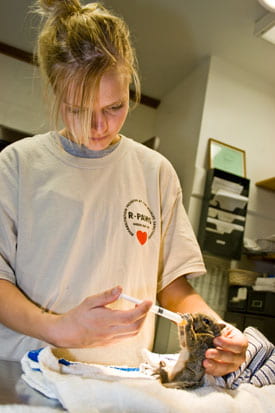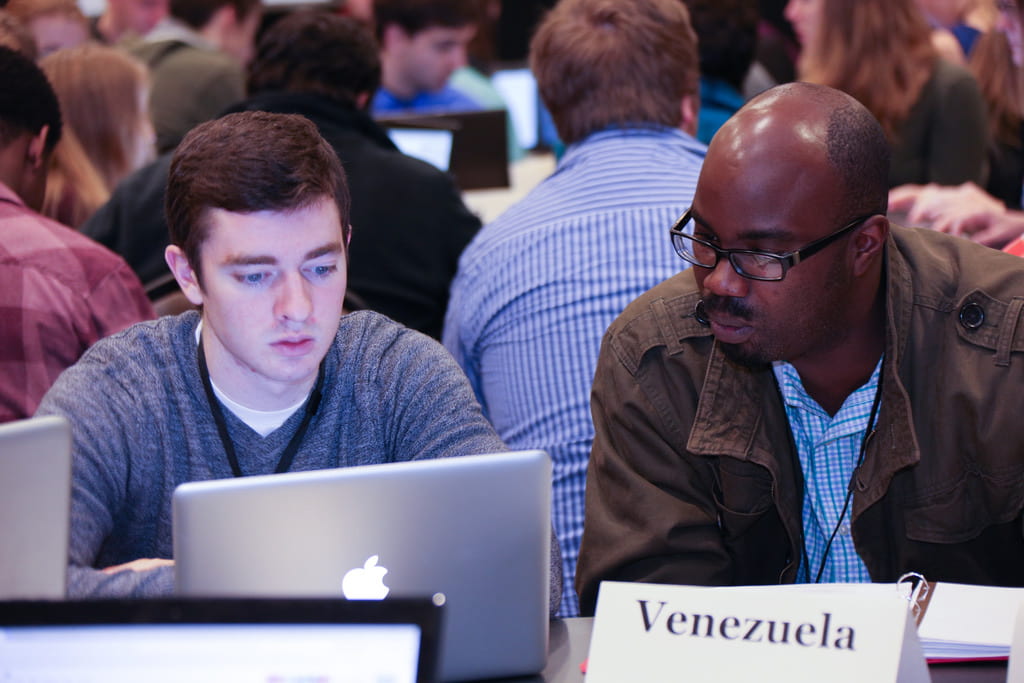Keepers of the critters
With more than 4,000 animals taken in each year, the Bay Beach Wildlife Sanctuary in Green Bay needs as many helping hands as it can get.
Many of those hands come from the UW-Green Bay campus just down the road.
[youtube id=”ZFWvNpYElQQ” width=”400″ height=”245″]
The Wildlife Sanctuary partners with UW-Green Bay to provide internship opportunities for students from all majors. The sanctuary has between two and four UW-Green Bay interns during the school year, and between five and eight local interns during the summer months.
 “We’re very lucky with the (UW) GB program with having interns and work-study students come in,” said Lori Bankson, Bay Beach Wildlife Sanctuary senior animal keeper. “That helps lighten the load tremendously.”
“We’re very lucky with the (UW) GB program with having interns and work-study students come in,” said Lori Bankson, Bay Beach Wildlife Sanctuary senior animal keeper. “That helps lighten the load tremendously.”
The sanctuary gets the helping hands it needs, and the students get help in their educational careers by gaining hands-on experience in a variety of areas with a variety of wild animals.
It’s “not just cleaning the cages,” Bankson said. Students will educate the public about animals, administer medications, work with citizens who bring in injured animals, and reintroduce rehabilitated animals into the wild.
“It’s not like a classroom at all. What you learn from a book, and what you do here is totally different,” said Becky Carr, a junior Environmental Policy and Planning major whose shirt reads ‘Born to be Wild’ on the back.
Video Transcript
UW-Green Bay interns at the Bay Beach Wildlife Sanctuary
Lori Bankson
Bay Beach Wildlife Sanctuary, Senior Animal Keeper
We couldn’t run our rehab program without the interns, because we take in over 4,000 animals every year. And we really need them to help us succeed and help get these animals healthy.TEXT
Interns have jobs in many areas of the 700-acre wildlife preserve.Amanda Wright
Graduate, Biology Major
We get a lot of hands-on experience with wildlife, which is basically what I want to do. You just get to be up and close with animals that you don’t get to see that often.Rachel Anderson
Sophomore, Biology Major
I am able to train under people who are doing exactly what I’d like to do. So not only am I able to learn about the job from them, I’m able to see the day-to-day procedures and really be a part of it. So, I know for sure that I’m pursuing what I’d like to do.Becky Carr
Junior, Environmental Policy and Planning Major
It’s not like a classroom at all. What you learn from a book, and what you do here is totally different. I learned so much here (compared to) what I can learn in any class.
Lori Bankson
You know, it’s just such a valuable resource having the college so close, and that having so many students involved.For the GB interns that we have in over the summer — we also have a couple during the year through different classes — they’re at all different levels. We have some that have been animal keepers that want to start doing animal rehab. We have some that have never been a part of the sanctuary and just want to come in. We have some people that have been volunteers in the past. So, everybody starts maybe at a different spot, but we go in and we train right away. And you’re never told to just go on by yourself and try to learn this on your own. You’re always with somebody to help. That’s what I do, that’s what our curator does, our naturalist staff. We’re always here to help because it’s a constant learning experience. And some you do get on-the-job, some things we give you to take home and read, so it’s a lot of training, but it’s a lot of different areas for you to learn from.
Becky Carr
In the animal-care world, I’ve always been told that experience is more important than just going to school and having a certain degree in animal anything. So, having the experience in this kind of job and using this as a reference for any job I want in the future, or any other position, is going to be good.Lori Bankson
I always say that this is the best place to have the learning experience, because we do so much hands-on. You’re not just cleaning the cages. You’re here doing the work and administering meds, doing care, taking the animal in, talking to the public. So you get all areas of working with wildlife rehab.We’re very lucky with the GB program with having interns and work-study students come in. That helps lighten the load tremendously.
TEXT
www.uwgb.edu/
www.baybeachwildlife.com/
###





